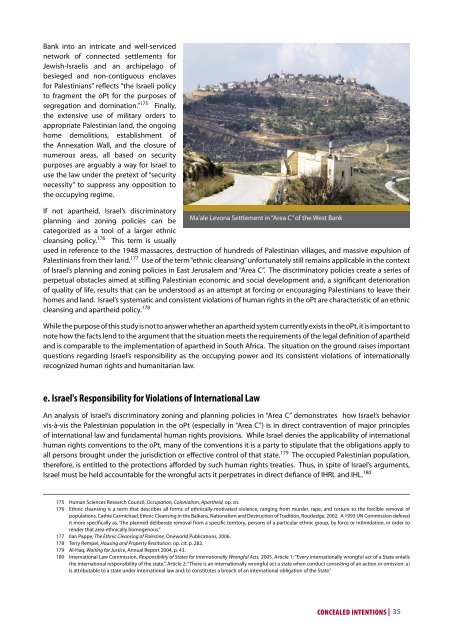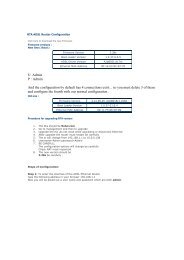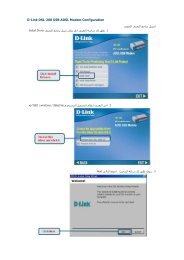Concealed Intentions- JLAC-.pdf
Concealed Intentions- JLAC-.pdf
Concealed Intentions- JLAC-.pdf
Create successful ePaper yourself
Turn your PDF publications into a flip-book with our unique Google optimized e-Paper software.
Bank into an intricate and well-serviced<br />
network of connected settlements for<br />
Jewish-Israelis and an archipelago of<br />
besieged and non-contiguous enclaves<br />
for Palestinians” reflects “the Israeli policy<br />
to fragment the oPt for the purposes of<br />
segregation and domination.” 175 Finally,<br />
the extensive use of military orders to<br />
appropriate Palestinian land, the ongoing<br />
home demolitions, establishment of<br />
the Annexation Wall, and the closure of<br />
numerous areas, all based on security<br />
purposes are arguably a way for Israel to<br />
use the law under the pretext of “security<br />
necessity” to suppress any opposition to<br />
the occupying regime.<br />
If not apartheid, Israel’s discriminatory<br />
planning and zoning policies can be<br />
Ma’ale Levona Settlement in “Area C” of the West Bank<br />
categorized as a tool of a larger ethnic<br />
cleansing policy. 176 This term is usually<br />
used in reference to the 1948 massacres, destruction of hundreds of Palestinian villages, and massive expulsion of<br />
Palestinians from their land. 177 Use of the term “ethnic cleansing” unfortunately still remains applicable in the context<br />
of Israel’s planning and zoning policies in East Jerusalem and “Area C”. The discriminatory policies create a series of<br />
perpetual obstacles aimed at stifling Palestinian economic and social development and, a significant deterioration<br />
of quality of life, results that can be understood as an attempt at forcing or encouraging Palestinians to leave their<br />
homes and land. Israel’s systematic and consistent violations of human rights in the oPt are characteristic of an ethnic<br />
cleansing and apartheid policy. 178<br />
While the purpose of this study is not to answer whether an apartheid system currently exists in the oPt, it is important to<br />
note how the facts lend to the argument that the situation meets the requirements of the legal definition of apartheid<br />
and is comparable to the implementation of apartheid in South Africa. The situation on the ground raises important<br />
questions regarding Israel’s responsibility as the occupying power and its consistent violations of internationally<br />
recognized human rights and humanitarian law.<br />
e. Israel's Responsibility for Violations of International Law<br />
An analysis of Israel’s discriminatory zoning and planning policies in “Area C” demonstrates how Israel’s behavior<br />
vis-à-vis the Palestinian population in the oPt (especially in “Area C”) is in direct contravention of major principles<br />
of international law and fundamental human rights provisions. While Israel denies the applicability of international<br />
human rights conventions to the oPt, many of the conventions it is a party to stipulate that the obligations apply to<br />
all persons brought under the jurisdiction or effective control of that state. 179 The occupied Palestinian population,<br />
therefore, is entitled to the protections afforded by such human rights treaties. Thus, in spite of Israel’s arguments,<br />
Israel must be held accountable for the wrongful acts it perpetrates in direct defiance of IHRL and IHL. 180<br />
175 Human Sciences Research Council, Occupation, Colonialism, Apartheid, op. cit.<br />
176 Ethnic cleansing is a term that describes all forms of ethnically-motivated violence, ranging from murder, rape, and torture to the forcible removal of<br />
populations. Cathie Carmichael, Ethnic Cleansing in the Balkans, Nationalism and Destruction of Tradition, Routledge, 2002. A 1993 UN Commission defined<br />
it more specifically as, “the planned deliberate removal from a specific territory, persons of a particular ethnic group, by force or intimidation, in order to<br />
render that area ethnically homogenous.”<br />
177 Ilan Pappe, The Ethnic Cleansing of Palestine, Oneworld Publications, 2006.<br />
178 Terry Rempel, Housing and Property Restitution, op. cit. p. 282.<br />
179 Al-Haq, Waiting for Justice, Annual Report 2004, p. 43.<br />
180 International Law Commission, Responsibility of States for Internationally Wrongful Acts, 2005. Article 1: “Every internationally wrongful act of a State entails<br />
the international responsibility of the state.”. Article 2: “There is an internationally wrongful act a state when conduct consisting of an action or omission: a)<br />
is attributable to a state under international law and; b) constitutes a breach of an international obligation of the State.”<br />
35





